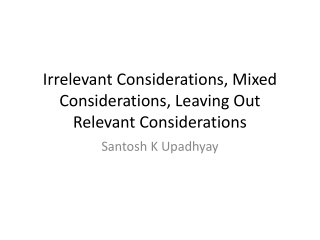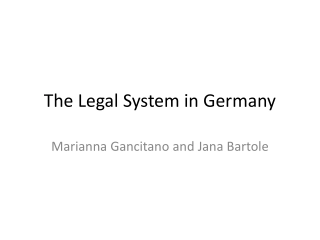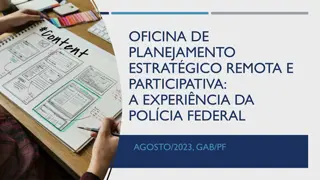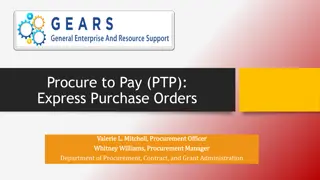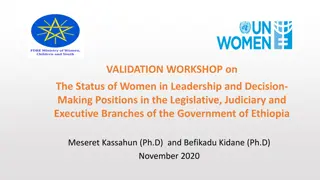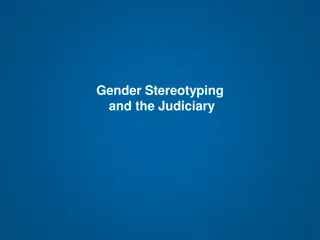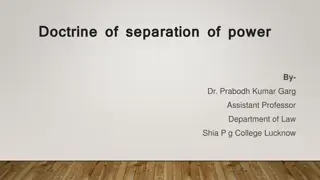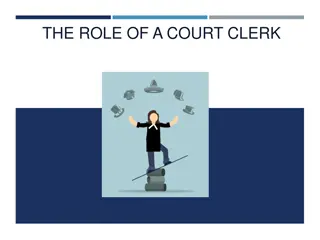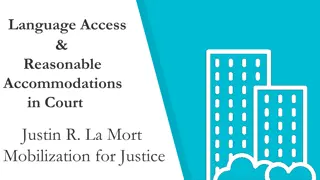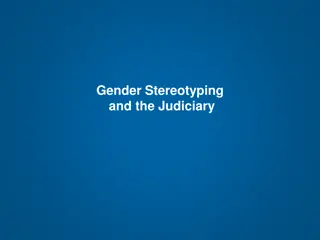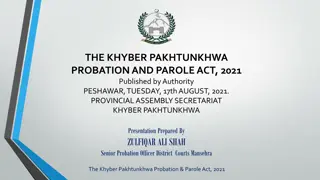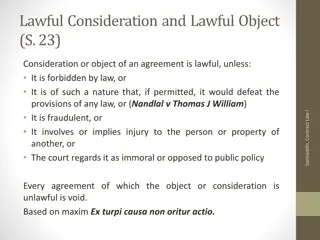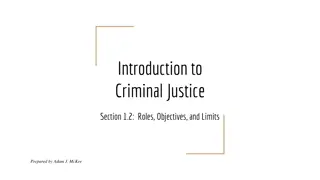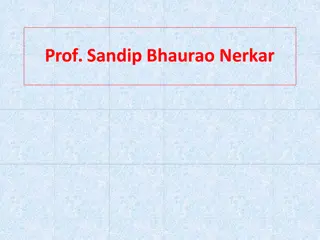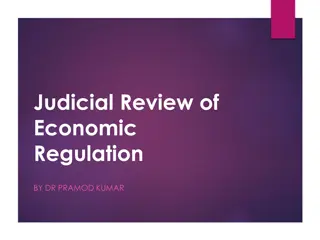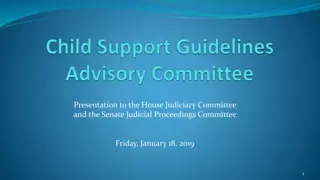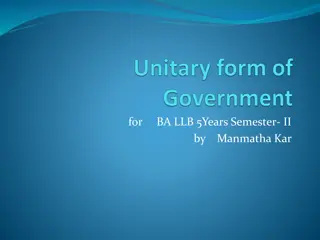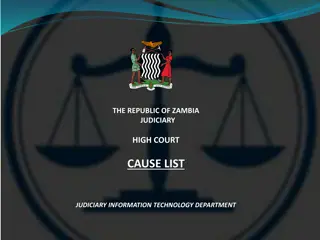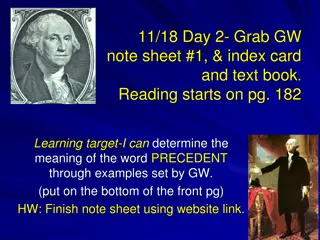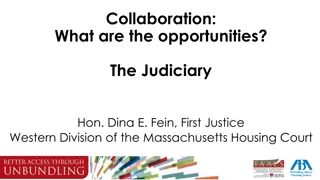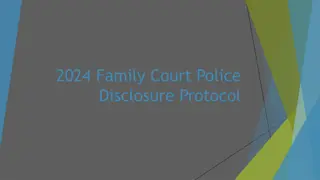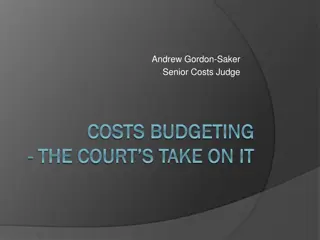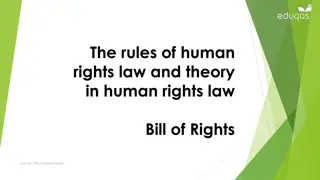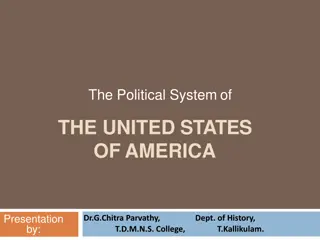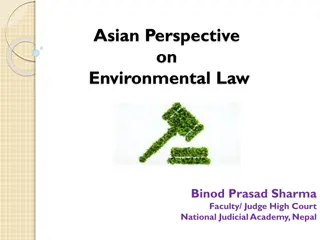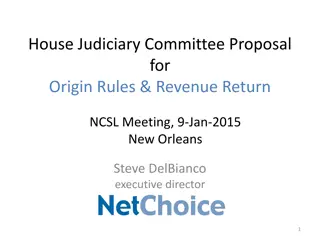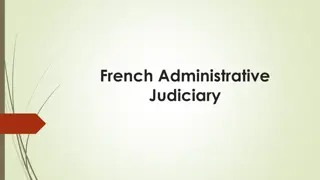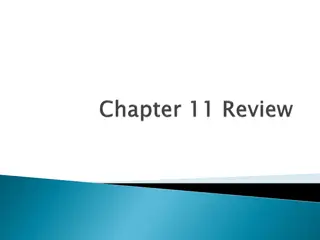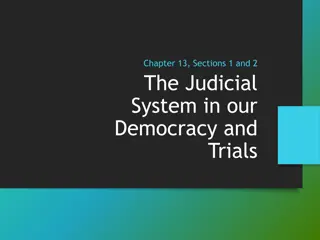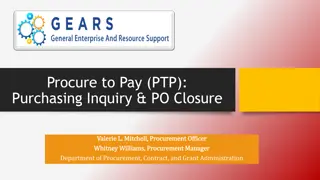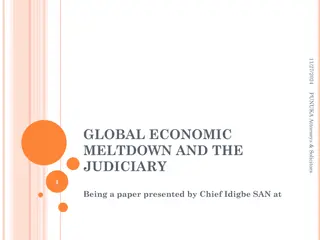Relevant Considerations in Exercising Discretion
Explore the importance of relevant considerations in exercising discretion by public authorities. Learn how the judiciary reviews administrative actions based on good or bad reasons. Dive into legal cases highlighting the significance of guiding discretion with relevant factors.
1 views • 15 slides
The Legal System in Germany
Explore the federal parliamentary republic system in Germany, where legislative power lies with Bundestag and Bundesrat. Learn about the independent judiciary and the division of powers between federal and state levels.
2 views • 27 slides
Remote and Participatory Strategic Planning Workshop Experience at the Federal Police Agency
In August 2023, the Federal Police Agency conducted a remote and participatory strategic planning workshop aimed at implementing the PF80 Project, diagnosing institutional problems from the perspective of employees, receiving proposals, and initiating the strategic planning process. The workshop inv
0 views • 41 slides
Project Update: TIC Portfolio Monitoring and Strategic Map
The document provides a detailed update on the monitoring of service, programs, and projects related to ICT for July 2023. It includes insights on the strategic map of ICT for the Judiciary, project summaries, project numbers, and progress on specific initiatives like the promotion of Digital Justic
3 views • 23 slides
Understanding the Different Organs of the State in Bangladesh
Explore the roles and functions of the Executive, Legislature, and Judiciary in the state of Bangladesh. Learn about the formation of the Executive branch, the significance of the President and Prime Minister, and the interrelation between the Executive, Legislature, and Judiciary. Gain insights int
1 views • 38 slides
Judiciary Procurement Processes Overview
The Judiciary's Department of Procurement, Contract, and Grant Administration (DPCGA) manages the procurement of goods and services, utilizing Corporate Purchase Orders and Express Purchase Orders to streamline the process. This includes creating, canceling, and changing Express POs in accordance wi
0 views • 18 slides
Validation Workshop on the Status of Women in Leadership in Ethiopia
This validation workshop in Ethiopia assessed the status of women in leadership and decision-making positions in the legislative, judiciary, and executive branches of government. Despite their significant population representation, women are not equally represented in crucial roles. The study highli
0 views • 56 slides
Gender-based Violence Against Women in the Judiciary
Gender-based violence against women refers to violence directed at women because of their gender, encompassing physical, mental, and sexual harm, coercion, and deprivation of liberty. The judiciary plays a crucial role in addressing wrongful gender stereotyping in gender-based violence cases to ensu
0 views • 16 slides
Understanding the Doctrine of Separation of Power by Dr. Prabodh Kumar Garg
The doctrine of separation of power, as elucidated by Dr. Prabodh Kumar Garg, emphasizes the distinct roles of the executive, legislative, and judiciary branches to maintain checks and balances in governance. Originated by Montesquieu, this principle safeguards against tyranny and ensures liberty by
0 views • 27 slides
The Role of a Court Clerk in Manitoba
Court clerks play a vital role in the judicial system of Manitoba, assisting in court proceedings, maintaining order in the courtroom, recording decisions accurately, and handling sensitive evidence. They are responsible for various duties such as monitoring court proceedings, preparing dockets, han
0 views • 16 slides
Language Access & Reasonable Accommodations in Court
Explore the importance of language access and reasonable accommodations in court settings, detailing laws such as Judiciary Law 390 and Uniform Rules for NY State Trial Courts Part 217. Discover top non-English languages used in court, in-person translation services, and how to report interpretation
0 views • 23 slides
Understanding Gender Stereotyping and its Impact on the Judiciary
Gender stereotyping, both in the form of beliefs and practices, permeates society and can have detrimental effects, particularly within the judicial system. This pervasive issue extends beyond generalized views about men and women, affecting individuals' identities and intersecting with other stereo
0 views • 25 slides
The Khyber Pakhtunkhwa Probation and Parole Act, 2021 Overview
The Khyber Pakhtunkhwa Probation and Parole Act, 2021, outlines the establishment and functioning of the criminal justice system in the province. It discusses the roles of various agencies like judiciary, prosecution, police, probation, and prisons in controlling crime. The Directorate of Reclamatio
0 views • 29 slides
Understanding Lawful Consideration and Public Policy in Contracts
Lawful consideration and public policy play vital roles in determining the validity of agreements. According to Section 23 and Section 24 of contract law, consideration and object must be lawful, and agreements are void if they involve unlawful elements. Public policy considerations guide the judici
0 views • 4 slides
Understanding the Roles in Criminal Justice System
The criminal justice system involves three branches of government, each with specific responsibilities, operating at federal, state, and local levels. Law enforcement is primarily a local government function, while legislatures determine criminal laws and punishments. Statutes organized into codes d
0 views • 35 slides
Enhancing Judicial Capacity for Environmental Law: Curriculum and Challenges
Environmental law curriculum for judicial education emphasizes the importance of knowledge and expertise in handling environmental justice issues. Prerequisites include competent rule of law, mature judicial system, independent bar, and well-equipped enforcement agencies. To address challenges faced
0 views • 18 slides
Understanding the Indian Federal System
The Indian federal system as defined by the Constitution of India establishes a unique structure where power is divided between the central government and the states. This system features characteristics such as governments at two levels, division of power, a written constitution, independent judici
2 views • 19 slides
Ensuring Judicial Independence and Accountability: Model Code of Judicial Conduct
An overview of the history and significance of the Model Code of Judicial Conduct, focusing on judicial independence, integrity, and accountability. The discussion highlights the crucial role of an impartial judiciary in upholding the rule of law and the efforts made to update and maintain ethical s
0 views • 16 slides
Judicial Review of Economic Regulation: A Case Study
Courts have limited scope in reviewing economic policy matters unless decisions are arbitrary, mala fide, or violate laws. A recent case involving the Small Scale Industrial Manufacturers Association vs. Union of India showcases the challenges of judicial review in economic distress situations cause
0 views • 15 slides
Presentation to Judiciary and Senate Committees on Maryland Child Support Guidelines
Introduction, purpose, committee members, quick history of Maryland guidelines, income shares model, and 2016 quadrennial review presented to the House Judiciary Committee and Senate Judicial Proceedings Committee to discuss current issues, proposed solutions, and legislative considerations regardin
0 views • 38 slides
Comparison of Unitary and Federal Government Systems
This presentation compares unitary and federal government systems, highlighting differences in the number of governments, constitution type, flexibility, division of powers, supremacy of constitution, judiciary independence, and legislative structure. It explains how unitary governments have a singl
0 views • 7 slides
High Court Cause List for Tuesday, 6th March 2018 in Zambia Judiciary
High Court cause list for Tuesday, 6th March 2018 featuring various cases with applicants, respondents, representing attorneys, and time schedules, presided by Honorable Justice N.A. Sharpe-Phiri.
0 views • 37 slides
Understanding Presidential Precedents in US History
Learn about the concept of presidential precedents through the pioneering actions of George Washington as the first President of the United States in 1789. Explore how these precedents, such as the Judiciary Act of 1789 and the Unwritten Constitution, have shaped the functioning of the US government
0 views • 24 slides
George Washington's Presidency: Establishing Governmental Precedents
George Washington, as the first President of the United States, set important precedents during his two terms in office from 1789 to 1797. He established the federal court system under the Judiciary Act of 1789, appointed the first Supreme Court justices including John Jay, and formed the first Pres
0 views • 16 slides
Enhancing Access to Justice through Limited Assistance Representation in Massachusetts
The Massachusetts Judiciary, led by First Justice Hon. Dina E. Fein, has implemented Limited Assistance Representation (LAR) to allow attorneys to assist self-represented litigants on a limited basis. This initiative aims to expand access to justice by providing legal support without full representa
0 views • 8 slides
Innovative Case & Court Docket Management Strategies
Explore effective elements of management for case and court docket management, including planning, organizing, directing, coordinating, and controlling. Learn about strategic approaches as advocated by Peter Drucker, and discover the significance of management in the judiciary model court along with
0 views • 30 slides
Understanding the Judicial Branch of the Federal Government
The Judicial Branch, as the third branch of the federal government, ensures fair law enforcement and interprets laws through criminal and civil cases. Federal courts were established to address issues of state-based justice disparities. The judiciary system comprises district courts for trials, circ
1 views • 34 slides
Enhanced Family Court Police Disclosure Protocol for 2024
The 2024 Family Court Police Disclosure Protocol addresses key issues identified in the 2013 protocol, emphasizing timely and proportionate requests for material. Changes include a new checklist for the judiciary, guidance notes, and revised processes for litigants in person. The protocol provides c
1 views • 19 slides
The Courts' Perspective on Costs Budgeting in Litigation
The senior costs judge expresses concerns about judiciary involvement in managing parties' budgets, highlighting potential inefficiencies and drawbacks. Emphasizing the importance of skilled professionals working efficiently, the article underscores the need for more costs education for judges to ac
1 views • 11 slides
Understanding the Debate around a Bill of Rights in the UK
Explore the discussion on whether the UK needs a Bill of Rights, weighing the advantages and disadvantages. Consider examples globally, evaluate the impact on the judiciary and rights protection, and ponder the implications of introducing a Bill of Rights.
0 views • 10 slides
Understanding Moral and Constitutional Values in Relation to Judiciary
Explore the concepts of moral values and constitutional values, emphasizing their importance in decision-making processes and societal norms. Discover the stages of moral development and delve into constitutional values such as sovereignty, socialism, secularism, democracy, justice, liberty, equalit
0 views • 9 slides
The Political System of the United States of America
The presentation by Dr. G. Chitra Parvathy explores the political system of the United States, highlighting its historical development as the oldest continuous democracy. The division of powers into the legislative, executive, and judicial branches, along with the roles of the President, Senate, Hou
0 views • 13 slides
Perspectives on Environmental Law in South Asia
The judiciary in South Asian countries like India, Pakistan, and Bangladesh plays a vital role in upholding environmental justice and promoting sustainable development. These judiciaries have interpreted constitutional rights to include a healthy environment, leading to landmark decisions that integ
0 views • 15 slides
House Judiciary Committee Proposal for Origin Rules & Revenue Return
House Judiciary Committee proposes principles for interstate taxation, focusing on tax relief, simplicity, tech neutrality, tax competition, states' rights, and privacy. It discusses implementing origin sourcing and a multistate compact to ensure fair taxation for online sales. The compact incentivi
0 views • 13 slides
Judicial Conduct and Ethics in the Legal System
Discussion on the appropriate conduct of judges in public, campaign photos, and speaking engagements about judicial activism within the legal system. Exploring the guidelines set forth by the Judiciary Code for judges' behavior and activities to maintain integrity and independence in the judiciary.
0 views • 22 slides
Evolution of the French Administrative Judiciary System
Explore the rich historical development of the French Administrative Judiciary system from the pre-revolutionary period to modern times. Learn about key events such as the French Revolution, the creation of specialized courts, and the types of disputes handled by the administrative judiciary. Discov
0 views • 27 slides
Political Events and Challenges in Early 19th Century America
Jefferson's election, Burr as VP, and the peaceful transfer of power marked a significant period. The Judiciary Act of 1801 and Marbury vs. Madison case highlighted the role of the Judiciary. Jefferson's dilemma with the Louisiana Purchase, Burr's controversial actions, and America's struggles betwe
0 views • 11 slides
Understanding the Judiciary and Trial Courts in a Democracy
Learn about the judiciary's role in democracy, including principles like judicial review and independence. Explore the function of trial courts, the trial process, and the importance of juries in resolving legal disputes.
0 views • 22 slides
Judiciary Procurement Department Overview
The Procure-to-Pay process in the Judiciary's Department of Procurement involves various stages such as Purchasing Inquiry, PO Reconciliation, and PO Closure managed by officers like Valerie L. Mitchell and Whitney Williams. The department is responsible for procuring goods and services according to
0 views • 12 slides
Global Economic Meltdown and the Role of the Judiciary - A Critical Analysis
Chief Idigbe SAN presents a paper on the global economic meltdown and its impact on the judiciary, focusing on causes, effects, and solutions. The paper delves into the subprime mortgage crisis in the United States, deregulated banking sectors, and the responsibilities of judicial officers. It addre
0 views • 16 slides
